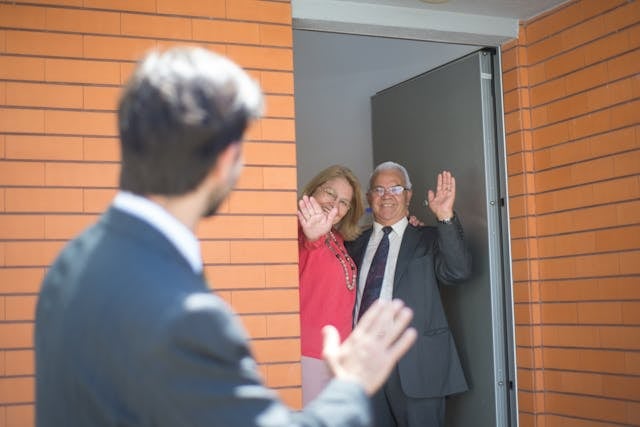Essential Polish Greetings to Sound Like a Native Speaker
The Polish language offers a variety of greetings that can help you sound like a native speaker, whether you’re strolling through the streets of Warsaw, meeting Polish friends, or wishing a Polish co-worker a Merry Christmas. Even if you’re not committed to learning Polish in depth, understanding Polish greetings not only helps you blend in but also opens the door to meaningful interactions.
In this blog, we’ll explore formal and informal Polish greetings to demonstrate you don’t need to be fluent in a language to start speaking it.
→Sign Up Now: Free Trial Polish Lesson With a Native Teacher!←
Here we go.
Informal Ways of Saying Hello in Polish
Cześć (“Hello”)
Cześć is the quintessential Polish greeting, equivalent to the English “hello.” It’s typically reserved for individuals within your personal circle, such as family, friends, and acquaintances with whom you share a relaxed relationship. It would be considered inappropriate to use this greeting with someone in a formal setting, like a professor or a supermarket cashier. Notably, cześć also doubles as a farewell, making it a versatile option in casual exchanges.
Hej (“Hey”)
For another casual alternative to cześć, hej mirrors the informal nature of the English “hey” and offers a laid-back way to greet acquaintances. Though not as commonly used as cześć, it serves as a friendly salutation in relaxed, informal settings where a simple and unpretentious greeting is needed.
Siema (“Howdy” / “What’s Up”)
Siema, a colloquial and highly informal greeting, is often heard among close friends and peers seeking a casual interaction. Originating as a shorthand for jak się masz?, which means “how do you do?”, siema carries a casual and friendly tone akin to “howdy” in English. It’s a popular choice among younger individuals or those aiming for a laid-back demeanour, though it’s advisable to reserve this greeting for friends to avoid potential social missteps.

Neutral to Formal Ways of Saying Hello in Polish
Halo (“Hello”)
Halo is uniquely designated for telephone conversations in Polish, marking the start of a call rather than a face-to-face interaction. While not informal like cześć or hej, it’s a straightforward way to answer the phone. Some may prefer słucham (“I’m listening”) for its slightly more polite connotation, but both are generally acceptable. Depending on who’s on the other end, adapting your greeting to the caller’s relationship (using more personal or formal salutations) is a common practice.
Dzień Dobry (“Good Morning” / “Good Afternoon”)
In Poland, dzień dobry serves as the standard formal salutation during the daylight hours, effectively covering both morning and afternoon greetings. This phrase, translating directly to “good day,” interestingly places the adjective “dobry” (good) after “dzień” (day), deviating from the order found in English. Dzień dobry has become the go-to greeting in formal or semi-formal settings, suitable for a variety of individuals from professional acquaintances and service workers to those in positions of authority or the elderly.
Dobry Wieczór (“Good Evening”)
Moving into the night, dobry wieczór is the evening counterpart to dzień dobry, keeping a similar level of formality. The distinction between evening and the rest of the day can sometimes blur, leading many to continue using dzień dobry until night falls firmly. However, after around 6 to 7 PM, it is perfectly appropriate, though not mandatory, to switch to dobry wieczór to reflect the time of day accurately.
Witam (“Welcome”)
Witam is primarily used in hosting situations, akin to the English “welcome.” It’s part of a family of greetings derived from the verb witać, meaning “to greet” or “to welcome.” While predominantly seen in contexts where one is acting as a host, variations of this greeting can adapt to different numbers and familiarity levels of the individuals being addressed.
Different Ways of Saying Goodbye in Polish
Dobranoc (“Good Night”)
Dobranoc is the customary Polish greeting to bid farewell in the evening or right before bedtime. It’s a polite and warm expression suitable for ending conversations as the day draws to a close. Whether you’re parting ways with friends after an evening gathering or saying goodnight to family members before sleep, dobranoc is a useful way of wishing someone a peaceful night. It’s most appropriate in personal settings and less common in professional contexts.
Do Widzenia! (“Goodbye”)
Do widzenia is a standard and formal way of saying goodbye in Polish, applicable in a wide array of situations. Translating directly to “until seeing (you again),” this phrase is used universally when parting ways, regardless of the time of day. Suitable for both formal and casual settings, do widzenia is a safe and simple choice.
Do Zobaczenia (“See You”)
Do zobaczenia is the Polish equivalent of “see you,” offering a less formal way to say goodbye while implying an expectation of meeting again in the future. This phrase carries a sense of continuity and reassurance, making it an ideal choice for a casual parting.
Żegnaj (“Farewell”)
Żegnaj is a more definitive and formal expression for saying goodbye. It holds a tone of finality and seriousness, making it less common in everyday, casual farewells. This phrase would be most appropriate in situations of significant leave-taking, such as moving away or ending a long-term engagement, where the sense of departure is more pronounced and poignant.
Graba! / Grabula! / Witka! / Strzała! / Strzałeczka!
These are informal, slang expressions primarily used among men, often among close friends or acquaintances. They don’t have direct translations into English because they are more about the action they represent than the words themselves. However, these phrases are generally used to prompt a handshake or acknowledge one’s presence in a friendly, informal manner. They are equivalent to a casual “Hey!” or “What’s up?” but with the added element of encouraging a physical gesture of greeting, such as a handshake or a nod. They are not found in standard dictionaries and are used in very relaxed, informal settings.
Piątka! (“High Five!”)
Piątka literally means “five” in Polish and is used in the same way as “high five” is used in English. This greeting comes with the action of slapping hands together above your heads and is typically used among young people or those who share a casual relationship. It’s a way of greeting that also celebrates meeting or a mutual accomplishment. The literal meaning ties directly to the action, signifying the five fingers coming into contact.
Kopę lat! (“A Heap of Years!”)
Kopę lat is a colloquial way to say “It’s been ages!” or “Long time no see!” in Polish. Literally translating to “a heap of years,” this phrase emphasises the significant amount of time that has passed since the last encounter with someone. It’s a friendly, enthusiastic way to greet someone you haven’t seen for a long period, filled with the warmth of reconnection.
Sie masz! / Sie ma! (“How’re You Doing!”)
Sie masz or sie ma are shortened forms of Jak się masz, which translates to “How do you do?” or “How are you?” These slang versions are stripped-down, making them more casual and characteristic among younger people or close acquaintances. While the original phrase is formal, these abbreviated versions imply a level of familiarity and informality. They are equivalent to saying “What’s up?” or “How’s it going?” in English and are typical in relaxed, friendly conversations.

Special Polish Greetings
Wesołych Świąt (Merry Christmas)
Wesołych Świąt is the traditional Polish greeting for Christmas, with a literal translation of “Happy Holidays.” Although it directly corresponds to “Merry Christmas” in English, the phrase can be used more broadly for the holiday season.
Szczęśliwego Nowego Roku (Happy New Year)
Szczęśliwego Nowego Roku is how you wish someone a “Happy New Year” in Polish. This Polish greeting is used in the days leading up to New Year’s Eve and the beginning of January. Literally translating to “Happy New Year,” it is a universal greeting full of optimism and well wishes for the coming year.
Szczęśliwego Chanuki (Happy Hanukkah)
Szczęśliwego Chanuki is the Polish greeting for “Happy Hanukkah,” used during the eight-day Jewish festival of lights. The greeting extends wishes for happiness and joy during the Hanukkah celebrations. It is specifically used in the context of this holiday and can be shared among friends, family, and acquaintances who observe Hanukkah.
Wesołego Alleluja (Happy Easter)
Wesołego Alleluja is a traditional Polish Easter greeting, with “Alleluja” referring to the Christian exclamation “Hallelujah,” which is often associated with Easter celebrations. The literal translation of the entire phrase is akin to “Happy Hallelujah,” but its usage is equivalent to wishing someone a “Happy Easter.” This Polish greeting is used to express joy and commemorate the resurrection of Jesus Christ, reflecting the joyful spirit of the holiday.
Beyond Polish Greetings: Learn Polish with a Native Teacher
From Cześć to Wesołego Alleluja, understanding Polish greetings ensures you’re never at a loss for words while exploring Poland. But the journey doesn’t have to stop there. Beyond these greetings lies the vast landscape of conversational Polish, rich with expressions, idiomatic phrases, and cultural references waiting to be explored. At Language Trainers, we believe in going beyond basic greetings to help you develop real conversational skills. Our courses are tailored to your individual needs, ensuring that you learn Polish in a way that is both effective and relevant to your life.
→Sign Up Now: Free Trial Polish Lesson With a Native Teacher!←
Through one-to-one communication with a native teacher, you’ll receive constant feedback, allowing for a learning experience that adapts to your pace and interests. Whether you’re looking to deepen your understanding of Polish culture or need to communicate effectively in your personal or professional life, our personalised approach ensures that every lesson moves you closer to your goals.
So, why wait? Send us a quick message now and we’ll match you with a native teacher for a Polish course in London or wherever you happen to live! Contact Language Trainers now and let the journey begin.
